Deck 6: Applications of Differentiation
Question
Question
Question
Question
Question
Question
Question
Question
Question
Question
Question
Question
Question
Question
Question
Question
Question
Question
Question
Question
Question
Question
Question
Question
Question
Question
Question
Question
Question
Question
Question
Question
Question
Question
Question
Question
Question
Question
Question
Question
Question
Question
Question
Question
Question
Question
Question
Question
Question
Question
Question
Question
Question
Question
Question
Question
Question
Question
Question
Question
Question
Question
Question
Question
Question
Question
Question
Question
Question
Question
Question
Question
Question
Question
Question
Question
Question
Question
Question
Question

Unlock Deck
Sign up to unlock the cards in this deck!
Unlock Deck
Unlock Deck
1/107
Play
Full screen (f)
Deck 6: Applications of Differentiation
1
Determine whether Rolle's Theorem can be applied to  on the closed interval
on the closed interval  If Rolle's Theorem can be applied, find all values of c in the open interval
If Rolle's Theorem can be applied, find all values of c in the open interval  such that
such that 
A)Rolle's Theorem applies; c = 6, c = 18
B)Rolle's Theorem applies; c = 18
C)Rolle's Theorem applies; c = 8, c = 6
D)Rolle's Theorem applies; c = 8
E)Rolle's Theorem does not apply
 on the closed interval
on the closed interval  If Rolle's Theorem can be applied, find all values of c in the open interval
If Rolle's Theorem can be applied, find all values of c in the open interval  such that
such that 
A)Rolle's Theorem applies; c = 6, c = 18
B)Rolle's Theorem applies; c = 18
C)Rolle's Theorem applies; c = 8, c = 6
D)Rolle's Theorem applies; c = 8
E)Rolle's Theorem does not apply
Rolle's Theorem applies; c = 18
2
Determine whether Rolle's Theorem can be applied to  on the closed interval
on the closed interval  If Rolle's Theorem can be applied, find all values of c in the open interval
If Rolle's Theorem can be applied, find all values of c in the open interval  such that
such that 
A)c = 3, c = 8
B)c = 8
C)c = 7, c = 3
D)c = 7
E)Rolle's Theorem does not apply
 on the closed interval
on the closed interval  If Rolle's Theorem can be applied, find all values of c in the open interval
If Rolle's Theorem can be applied, find all values of c in the open interval  such that
such that 
A)c = 3, c = 8
B)c = 8
C)c = 7, c = 3
D)c = 7
E)Rolle's Theorem does not apply
Rolle's Theorem does not apply
3
Use a graphing utility to graph the function  and locate the absolute extrema of the function on the interval
and locate the absolute extrema of the function on the interval  .
.
A)absolute minimum: no absolute maximum
no absolute maximum
B)absolute minimum: no absolute maximum
no absolute maximum
C)absolute maximum: absolute minimum:
absolute minimum: 
D)absolute minimum: absolute maximum:
absolute maximum: 
E)absolute minimum: no absolute maximum
no absolute maximum
 and locate the absolute extrema of the function on the interval
and locate the absolute extrema of the function on the interval  .
.A)absolute minimum:
 no absolute maximum
no absolute maximumB)absolute minimum:
 no absolute maximum
no absolute maximumC)absolute maximum:
 absolute minimum:
absolute minimum: 
D)absolute minimum:
 absolute maximum:
absolute maximum: 
E)absolute minimum:
 no absolute maximum
no absolute maximumabsolute minimum:  no absolute maximum
no absolute maximum
 no absolute maximum
no absolute maximum 4
Locate the absolute extrema of the function ![<strong>Locate the absolute extrema of the function on the closed interval [0,6].</strong> A)absolute max: (6, 144) ; absolute min: (2, -16) B)absolute max: (2, -16) ; absolute min: (6, 144) C)absolute max: (6, 144) ; no absolute min D)no absolute max; Absolute min: (6, 144) E)no absolute max or min](https://d2lvgg3v3hfg70.cloudfront.net/TBX8702/11ec1854_fda8_08e6_acfc_5deca05cb883_TBX8702_11.jpg) on the closed interval [0,6].
on the closed interval [0,6].
A)absolute max: (6, 144) ; absolute min: (2, -16)
B)absolute max: (2, -16) ; absolute min: (6, 144)
C)absolute max: (6, 144) ; no absolute min
D)no absolute max; Absolute min: (6, 144)
E)no absolute max or min
![<strong>Locate the absolute extrema of the function on the closed interval [0,6].</strong> A)absolute max: (6, 144) ; absolute min: (2, -16) B)absolute max: (2, -16) ; absolute min: (6, 144) C)absolute max: (6, 144) ; no absolute min D)no absolute max; Absolute min: (6, 144) E)no absolute max or min](https://d2lvgg3v3hfg70.cloudfront.net/TBX8702/11ec1854_fda8_08e6_acfc_5deca05cb883_TBX8702_11.jpg) on the closed interval [0,6].
on the closed interval [0,6].A)absolute max: (6, 144) ; absolute min: (2, -16)
B)absolute max: (2, -16) ; absolute min: (6, 144)
C)absolute max: (6, 144) ; no absolute min
D)no absolute max; Absolute min: (6, 144)
E)no absolute max or min

Unlock Deck
Unlock for access to all 107 flashcards in this deck.
Unlock Deck
k this deck
5
Determine whether Rolle's Theorem can be applied to the function  on the closed interval
on the closed interval  . If Rolle's Theorem can be applied, find all numbers c in the open interval
. If Rolle's Theorem can be applied, find all numbers c in the open interval  such that
such that  .
.
A)Rolle's Theorem applies; c =
B)Rolle's Theorem applies; c = ,
, 
C)Rolle's Theorem applies;
D)Rolle's Theorem does not apply
E)Rolle's Theorem does apply;
 on the closed interval
on the closed interval  . If Rolle's Theorem can be applied, find all numbers c in the open interval
. If Rolle's Theorem can be applied, find all numbers c in the open interval  such that
such that  .
.A)Rolle's Theorem applies; c =

B)Rolle's Theorem applies; c =
 ,
, 
C)Rolle's Theorem applies;

D)Rolle's Theorem does not apply
E)Rolle's Theorem does apply;


Unlock Deck
Unlock for access to all 107 flashcards in this deck.
Unlock Deck
k this deck
6
Locate the absolute extrema of the function  on the closed interval
on the closed interval  .
.
A)no absolute max; absolute min: (-3, 14)
B)absolute max: (6, -148) ; absolute min: (-3, 14)
C)absolute max: (-3, 14) ; no absolute min
D)absolute max: (-3, 14) ; absolute min: (6, -148)
E)no absolute max or min
 on the closed interval
on the closed interval  .
.A)no absolute max; absolute min: (-3, 14)
B)absolute max: (6, -148) ; absolute min: (-3, 14)
C)absolute max: (-3, 14) ; no absolute min
D)absolute max: (-3, 14) ; absolute min: (6, -148)
E)no absolute max or min

Unlock Deck
Unlock for access to all 107 flashcards in this deck.
Unlock Deck
k this deck
7
The ordering and transportation cost C for components used in a manufacturing process is approximated by  where C is measured in thousands of dollars and x is the order size in hundreds. According to Rolle's Theorem, the rate of change of the cost must be 0 for some order size in the interval
where C is measured in thousands of dollars and x is the order size in hundreds. According to Rolle's Theorem, the rate of change of the cost must be 0 for some order size in the interval  Find this order size. Round your answer to three decimal places.
Find this order size. Round your answer to three decimal places.
A)5.174 components
B)5.598 components
C)4.098 components
D)6.674 components
E)8.196 components
 where C is measured in thousands of dollars and x is the order size in hundreds. According to Rolle's Theorem, the rate of change of the cost must be 0 for some order size in the interval
where C is measured in thousands of dollars and x is the order size in hundreds. According to Rolle's Theorem, the rate of change of the cost must be 0 for some order size in the interval  Find this order size. Round your answer to three decimal places.
Find this order size. Round your answer to three decimal places.A)5.174 components
B)5.598 components
C)4.098 components
D)6.674 components
E)8.196 components

Unlock Deck
Unlock for access to all 107 flashcards in this deck.
Unlock Deck
k this deck
8
Find the value of the derivative (if it exists) of  at the indicated extremum.
at the indicated extremum. 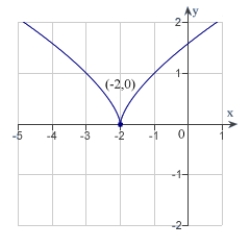
A)
B)
C)
D)
E) is undefined.
is undefined.
 at the indicated extremum.
at the indicated extremum. 
A)

B)

C)

D)

E)
 is undefined.
is undefined.
Unlock Deck
Unlock for access to all 107 flashcards in this deck.
Unlock Deck
k this deck
9
The formula for the power output of battery is  where V is the electromotive force in volts, R is the resistance, and I is the current. Find the current (measured in amperes) that corresponds to a maximum value of P in a battery for which
where V is the electromotive force in volts, R is the resistance, and I is the current. Find the current (measured in amperes) that corresponds to a maximum value of P in a battery for which  volts and
volts and  ohm. Assume that a 20-ampere fuse bounds the output in the interval
ohm. Assume that a 20-ampere fuse bounds the output in the interval  . Round your answer to two decimal places.
. Round your answer to two decimal places.
A)81.67 amperes
B)13,338.89 amperes
C)40.00 amperes
D)268.00 amperes
E)2.00 amperes
 where V is the electromotive force in volts, R is the resistance, and I is the current. Find the current (measured in amperes) that corresponds to a maximum value of P in a battery for which
where V is the electromotive force in volts, R is the resistance, and I is the current. Find the current (measured in amperes) that corresponds to a maximum value of P in a battery for which  volts and
volts and  ohm. Assume that a 20-ampere fuse bounds the output in the interval
ohm. Assume that a 20-ampere fuse bounds the output in the interval  . Round your answer to two decimal places.
. Round your answer to two decimal places.A)81.67 amperes
B)13,338.89 amperes
C)40.00 amperes
D)268.00 amperes
E)2.00 amperes

Unlock Deck
Unlock for access to all 107 flashcards in this deck.
Unlock Deck
k this deck
10
Sketch the graph of the function  and locate the absolute extrema of the function on the interval
and locate the absolute extrema of the function on the interval  .
.
A)left endpoint: absolute minimumright endpoint:
absolute minimumright endpoint:  absolute maximum
absolute maximum
B)left endpoint: absolute minimumright endpoint:
absolute minimumright endpoint:  absolute maximum
absolute maximum
C)left endpoint: absolute minimumright endpoint:
absolute minimumright endpoint:  absolute maximum
absolute maximum
D)left endpoint: absolute minimumright endpoint:
absolute minimumright endpoint:  absolute maximum
absolute maximum
E)left endpoint: absolute minimumright endpoint:
absolute minimumright endpoint:  absolute maximum
absolute maximum
 and locate the absolute extrema of the function on the interval
and locate the absolute extrema of the function on the interval  .
.A)left endpoint:
 absolute minimumright endpoint:
absolute minimumright endpoint:  absolute maximum
absolute maximumB)left endpoint:
 absolute minimumright endpoint:
absolute minimumright endpoint:  absolute maximum
absolute maximumC)left endpoint:
 absolute minimumright endpoint:
absolute minimumright endpoint:  absolute maximum
absolute maximumD)left endpoint:
 absolute minimumright endpoint:
absolute minimumright endpoint:  absolute maximum
absolute maximumE)left endpoint:
 absolute minimumright endpoint:
absolute minimumright endpoint:  absolute maximum
absolute maximum
Unlock Deck
Unlock for access to all 107 flashcards in this deck.
Unlock Deck
k this deck
11
Locate the absolute extrema of the function  on the closed interval
on the closed interval  .
.
A)absolute maximum: absolute minimum:
absolute minimum: 
B)absolute maximum: absolute minimum:
absolute minimum: 
C)absolute maximum: absolute minimum:
absolute minimum: 
D)absolute maximum: absolute minimum:
absolute minimum: 
E)absolute maximum: absolute minimum:
absolute minimum: 
 on the closed interval
on the closed interval  .
.A)absolute maximum:
 absolute minimum:
absolute minimum: 
B)absolute maximum:
 absolute minimum:
absolute minimum: 
C)absolute maximum:
 absolute minimum:
absolute minimum: 
D)absolute maximum:
 absolute minimum:
absolute minimum: 
E)absolute maximum:
 absolute minimum:
absolute minimum: 

Unlock Deck
Unlock for access to all 107 flashcards in this deck.
Unlock Deck
k this deck
12
Find any critical numbers of the function  , t < 4.
, t < 4.
A)0
B)
C)
D)
E)
 , t < 4.
, t < 4.A)0
B)

C)

D)

E)


Unlock Deck
Unlock for access to all 107 flashcards in this deck.
Unlock Deck
k this deck
13
Determine whether Rolle's Theorem can be applied to the function ![<strong>Determine whether Rolle's Theorem can be applied to the function on the closed interval [-1,5]. If Rolle's Theorem can be applied, find all values of c in the open interval (-1,5) such that .</strong> A)Rolle's Theorem applies; c = -2 B)Rolle's Theorem applies; c = 0.5 C)Rolle's Theorem does not apply D)Rolle's Theorem applies; c = 2 E)Rolle's Theorem applies; c = 3.5](https://d2lvgg3v3hfg70.cloudfront.net/TBX8702/11ec1854_fdaa_a02f_acfc_11d7fc5fc8e4_TBX8702_11.jpg) on the closed interval [-1,5]. If Rolle's Theorem can be applied, find all values of c in the open interval (-1,5) such that
on the closed interval [-1,5]. If Rolle's Theorem can be applied, find all values of c in the open interval (-1,5) such that ![<strong>Determine whether Rolle's Theorem can be applied to the function on the closed interval [-1,5]. If Rolle's Theorem can be applied, find all values of c in the open interval (-1,5) such that .</strong> A)Rolle's Theorem applies; c = -2 B)Rolle's Theorem applies; c = 0.5 C)Rolle's Theorem does not apply D)Rolle's Theorem applies; c = 2 E)Rolle's Theorem applies; c = 3.5](https://d2lvgg3v3hfg70.cloudfront.net/TBX8702/11ec1854_fdaa_a030_acfc_f10a51d16f3f_TBX8702_11.jpg) .
.
A)Rolle's Theorem applies; c = -2
B)Rolle's Theorem applies; c = 0.5
C)Rolle's Theorem does not apply
D)Rolle's Theorem applies; c = 2
E)Rolle's Theorem applies; c = 3.5
![<strong>Determine whether Rolle's Theorem can be applied to the function on the closed interval [-1,5]. If Rolle's Theorem can be applied, find all values of c in the open interval (-1,5) such that .</strong> A)Rolle's Theorem applies; c = -2 B)Rolle's Theorem applies; c = 0.5 C)Rolle's Theorem does not apply D)Rolle's Theorem applies; c = 2 E)Rolle's Theorem applies; c = 3.5](https://d2lvgg3v3hfg70.cloudfront.net/TBX8702/11ec1854_fdaa_a02f_acfc_11d7fc5fc8e4_TBX8702_11.jpg) on the closed interval [-1,5]. If Rolle's Theorem can be applied, find all values of c in the open interval (-1,5) such that
on the closed interval [-1,5]. If Rolle's Theorem can be applied, find all values of c in the open interval (-1,5) such that ![<strong>Determine whether Rolle's Theorem can be applied to the function on the closed interval [-1,5]. If Rolle's Theorem can be applied, find all values of c in the open interval (-1,5) such that .</strong> A)Rolle's Theorem applies; c = -2 B)Rolle's Theorem applies; c = 0.5 C)Rolle's Theorem does not apply D)Rolle's Theorem applies; c = 2 E)Rolle's Theorem applies; c = 3.5](https://d2lvgg3v3hfg70.cloudfront.net/TBX8702/11ec1854_fdaa_a030_acfc_f10a51d16f3f_TBX8702_11.jpg) .
.A)Rolle's Theorem applies; c = -2
B)Rolle's Theorem applies; c = 0.5
C)Rolle's Theorem does not apply
D)Rolle's Theorem applies; c = 2
E)Rolle's Theorem applies; c = 3.5

Unlock Deck
Unlock for access to all 107 flashcards in this deck.
Unlock Deck
k this deck
14
Find all critical numbers of the function  .
.
A)critical numbers:
B)critical numbers:
C)critical numbers:
D)critical numbers:
E)no critical numbers
 .
.A)critical numbers:

B)critical numbers:

C)critical numbers:

D)critical numbers:

E)no critical numbers

Unlock Deck
Unlock for access to all 107 flashcards in this deck.
Unlock Deck
k this deck
15
Find the value of the derivative (if it exists) of the function  at the extremum point (0,9).
at the extremum point (0,9). 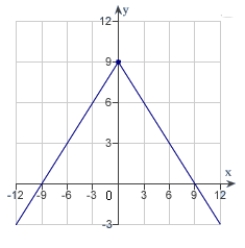
A)0
B)does not exist
C)9
D)-9
E)10
 at the extremum point (0,9).
at the extremum point (0,9). 
A)0
B)does not exist
C)9
D)-9
E)10

Unlock Deck
Unlock for access to all 107 flashcards in this deck.
Unlock Deck
k this deck
16
Determine whether Rolle's Theorem can be applied to the function  on the closed interval
on the closed interval  . If Rolle's Theorem can be applied, find all numbers c in the open interval
. If Rolle's Theorem can be applied, find all numbers c in the open interval  such that
such that  .
.
A)Rolle's Theorem applies;
B)Rolle's Theorem applies;
C)Rolle's Theorem applies;
D)Rolle's Theorem applies;
E)Rolle's Theorem does not apply
 on the closed interval
on the closed interval  . If Rolle's Theorem can be applied, find all numbers c in the open interval
. If Rolle's Theorem can be applied, find all numbers c in the open interval  such that
such that  .
.A)Rolle's Theorem applies;

B)Rolle's Theorem applies;

C)Rolle's Theorem applies;

D)Rolle's Theorem applies;

E)Rolle's Theorem does not apply

Unlock Deck
Unlock for access to all 107 flashcards in this deck.
Unlock Deck
k this deck
17
Use a computer algebra system to graph the function  and determine all absolute extrema on the interval
and determine all absolute extrema on the interval  .
.
A)absolute maximum: absolute minimum:
absolute minimum: 
B)absolute maximum: absolute minimum:
absolute minimum: 
C)absolute maximum: absolute minimum:
absolute minimum: 
D)absolute maximum: absolute minimum:
absolute minimum: 
E)absolute maximum: absolute minimum:
absolute minimum: 
 and determine all absolute extrema on the interval
and determine all absolute extrema on the interval  .
.A)absolute maximum:
 absolute minimum:
absolute minimum: 
B)absolute maximum:
 absolute minimum:
absolute minimum: 
C)absolute maximum:
 absolute minimum:
absolute minimum: 
D)absolute maximum:
 absolute minimum:
absolute minimum: 
E)absolute maximum:
 absolute minimum:
absolute minimum: 

Unlock Deck
Unlock for access to all 107 flashcards in this deck.
Unlock Deck
k this deck
18
Find the value of the derivative (if it exists) of the function  at the extremum point (0,0).
at the extremum point (0,0). 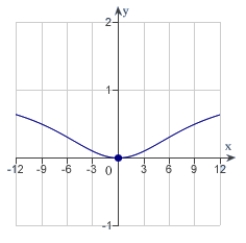
A)0
B)1
C)-1
D)
E)
 at the extremum point (0,0).
at the extremum point (0,0). 
A)0
B)1
C)-1
D)

E)


Unlock Deck
Unlock for access to all 107 flashcards in this deck.
Unlock Deck
k this deck
19
Locate the absolute extrema of the given function on the closed interval [-4,4]. ![<strong>Locate the absolute extrema of the given function on the closed interval [-4,4]. </strong> A)absolute max: (2, 1); absolute min (-2, -1) B)no absolute max; absolute min: (-2, -1) C)absolute max: (2, 1); absolute min (0, 0) D)absolute max: (2, 1); no absolute min E)absolute max: (0, 0); absolute min (-2, -1)](https://d2lvgg3v3hfg70.cloudfront.net/TBX8702/11ec1854_fda9_1a65_acfc_013801a92b36_TBX8702_11.jpg)
A)absolute max: (2, 1); absolute min (-2, -1)
B)no absolute max; absolute min: (-2, -1)
C)absolute max: (2, 1); absolute min (0, 0)
D)absolute max: (2, 1); no absolute min
E)absolute max: (0, 0); absolute min (-2, -1)
![<strong>Locate the absolute extrema of the given function on the closed interval [-4,4]. </strong> A)absolute max: (2, 1); absolute min (-2, -1) B)no absolute max; absolute min: (-2, -1) C)absolute max: (2, 1); absolute min (0, 0) D)absolute max: (2, 1); no absolute min E)absolute max: (0, 0); absolute min (-2, -1)](https://d2lvgg3v3hfg70.cloudfront.net/TBX8702/11ec1854_fda9_1a65_acfc_013801a92b36_TBX8702_11.jpg)
A)absolute max: (2, 1); absolute min (-2, -1)
B)no absolute max; absolute min: (-2, -1)
C)absolute max: (2, 1); absolute min (0, 0)
D)absolute max: (2, 1); no absolute min
E)absolute max: (0, 0); absolute min (-2, -1)

Unlock Deck
Unlock for access to all 107 flashcards in this deck.
Unlock Deck
k this deck
20
Locate the absolute extrema of the function  on the closed interval
on the closed interval  .
.
A)The absolute maximum is , and it occurs at either endpoint
, and it occurs at either endpoint  .The absolute minimum is 0, and it occurs at the critical number x = 0.
.The absolute minimum is 0, and it occurs at the critical number x = 0.
B)The absolute maximum is , and it occurs only at the right endpoint
, and it occurs only at the right endpoint  .The absolute minimum is 0 and it occurs at the critical number x = 0.
.The absolute minimum is 0 and it occurs at the critical number x = 0.
C)The absolute maximum is , and it occurs only at the left endpoint
, and it occurs only at the left endpoint  .The absolute minimum is 0 and it occurs at the critical number x = 0.
.The absolute minimum is 0 and it occurs at the critical number x = 0.
D)The absolute maximum is , and it occurs at the critical number x = 0.The absolute minimum is
, and it occurs at the critical number x = 0.The absolute minimum is  , and it occurs at the right endpoint
, and it occurs at the right endpoint  .
.
E)The absolute maximum is , and it occurs at the critical number x = 0.The absolute minimum is
, and it occurs at the critical number x = 0.The absolute minimum is  , and it occurs at the left endpoint
, and it occurs at the left endpoint  .
.
 on the closed interval
on the closed interval  .
.A)The absolute maximum is
 , and it occurs at either endpoint
, and it occurs at either endpoint  .The absolute minimum is 0, and it occurs at the critical number x = 0.
.The absolute minimum is 0, and it occurs at the critical number x = 0.B)The absolute maximum is
 , and it occurs only at the right endpoint
, and it occurs only at the right endpoint  .The absolute minimum is 0 and it occurs at the critical number x = 0.
.The absolute minimum is 0 and it occurs at the critical number x = 0.C)The absolute maximum is
 , and it occurs only at the left endpoint
, and it occurs only at the left endpoint  .The absolute minimum is 0 and it occurs at the critical number x = 0.
.The absolute minimum is 0 and it occurs at the critical number x = 0.D)The absolute maximum is
 , and it occurs at the critical number x = 0.The absolute minimum is
, and it occurs at the critical number x = 0.The absolute minimum is  , and it occurs at the right endpoint
, and it occurs at the right endpoint  .
.E)The absolute maximum is
 , and it occurs at the critical number x = 0.The absolute minimum is
, and it occurs at the critical number x = 0.The absolute minimum is  , and it occurs at the left endpoint
, and it occurs at the left endpoint  .
.
Unlock Deck
Unlock for access to all 107 flashcards in this deck.
Unlock Deck
k this deck
21
Which of the following functions passes through the point  and satisfies
and satisfies  ?
?
A)
B)
C)
D)
E)
 and satisfies
and satisfies  ?
?A)

B)

C)

D)

E)


Unlock Deck
Unlock for access to all 107 flashcards in this deck.
Unlock Deck
k this deck
22
A company introduces a new product for which the number of units sold S is  where t is the time in months since the product was introduced. Find the average value of
where t is the time in months since the product was introduced. Find the average value of  during the first year.
during the first year.
A)
B)
C)
D)
E)
 where t is the time in months since the product was introduced. Find the average value of
where t is the time in months since the product was introduced. Find the average value of  during the first year.
during the first year.A)

B)

C)

D)

E)


Unlock Deck
Unlock for access to all 107 flashcards in this deck.
Unlock Deck
k this deck
23
The height of an object t seconds after it is dropped from a height of 700 meters is  Find the time during the first 9 seconds of fall at which the instantaneous velocity equals the average velocity.
Find the time during the first 9 seconds of fall at which the instantaneous velocity equals the average velocity.
A)40.5 seconds
B)15.9 seconds
C)4.5 seconds
D)22.1 seconds
E)2.4 seconds
 Find the time during the first 9 seconds of fall at which the instantaneous velocity equals the average velocity.
Find the time during the first 9 seconds of fall at which the instantaneous velocity equals the average velocity.A)40.5 seconds
B)15.9 seconds
C)4.5 seconds
D)22.1 seconds
E)2.4 seconds

Unlock Deck
Unlock for access to all 107 flashcards in this deck.
Unlock Deck
k this deck
24
The graph of f is shown in the figure. Sketch a graph of the derivative of f. 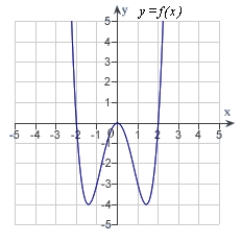
A)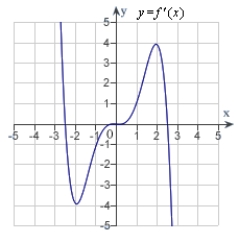
B)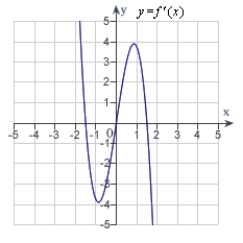
C)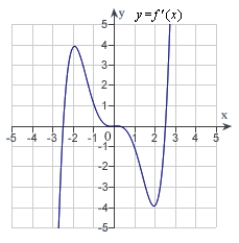
D)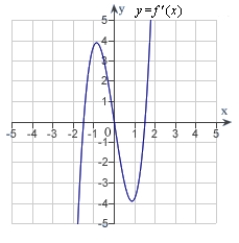
E)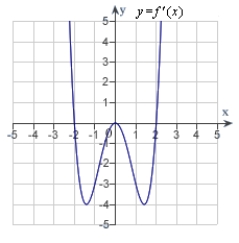

A)

B)

C)

D)

E)


Unlock Deck
Unlock for access to all 107 flashcards in this deck.
Unlock Deck
k this deck
25
A plane begins its takeoff at 2:00 P.M. on a 3000-mile flight. After 11.5 hours, the plane arrives at its destination. Explain why there are at least two times during the flight when the speed of the plane is 200 miles per hour.
A)By the Mean Value Theorem, there is a time when the speed of the plane must equal the average speed of 130.4 mi/hr. The speed was 200 mi/hr when the plane was accelerating to 130.4 mi/hr and decelerating from 130.4 mi/hr.
B)By the Mean Value Theorem, there is a time when the speed of the plane must equal the average speed of 173.9 mi/hr. The speed was 200 mi/hr when the plane was accelerating to 173.9 mi/hr and decelerating from 173.9 mi/hr.
C)By the Mean Value Theorem, there is a time when the speed of the plane must equal the average speed of 260.9 mi/hr. The speed was 200 mi/hr when the plane was accelerating to 260.9 mi/hr and decelerating from 260.9 mi/hr.
D)By the Mean Value Theorem, there is a time when the speed of the plane must equal the average speed of 222.2 mi/hr. The speed was 200 mi/hr when the plane was accelerating to 222.2 mi/hr and decelerating from 222.2 mi/hr.
E)By the Mean Value Theorem, there is a time when the speed of the plane must equal the average speed of 444.4 mi/hr. The speed was 200 mi/hr when the plane was accelerating to 444.4 mi/hr and decelerating from 444.4 mi/hr.
A)By the Mean Value Theorem, there is a time when the speed of the plane must equal the average speed of 130.4 mi/hr. The speed was 200 mi/hr when the plane was accelerating to 130.4 mi/hr and decelerating from 130.4 mi/hr.
B)By the Mean Value Theorem, there is a time when the speed of the plane must equal the average speed of 173.9 mi/hr. The speed was 200 mi/hr when the plane was accelerating to 173.9 mi/hr and decelerating from 173.9 mi/hr.
C)By the Mean Value Theorem, there is a time when the speed of the plane must equal the average speed of 260.9 mi/hr. The speed was 200 mi/hr when the plane was accelerating to 260.9 mi/hr and decelerating from 260.9 mi/hr.
D)By the Mean Value Theorem, there is a time when the speed of the plane must equal the average speed of 222.2 mi/hr. The speed was 200 mi/hr when the plane was accelerating to 222.2 mi/hr and decelerating from 222.2 mi/hr.
E)By the Mean Value Theorem, there is a time when the speed of the plane must equal the average speed of 444.4 mi/hr. The speed was 200 mi/hr when the plane was accelerating to 444.4 mi/hr and decelerating from 444.4 mi/hr.

Unlock Deck
Unlock for access to all 107 flashcards in this deck.
Unlock Deck
k this deck
26
A company introduces a new product for which the number of units sold S is  where t is the time in months since the product was introduced. During what month does
where t is the time in months since the product was introduced. During what month does  equal the average value of S(t) during the first year?
equal the average value of S(t) during the first year?
A)March
B)June
C)April
D)May
E)September
 where t is the time in months since the product was introduced. During what month does
where t is the time in months since the product was introduced. During what month does  equal the average value of S(t) during the first year?
equal the average value of S(t) during the first year?A)March
B)June
C)April
D)May
E)September

Unlock Deck
Unlock for access to all 107 flashcards in this deck.
Unlock Deck
k this deck
27
Identify the open intervals where the function  is increasing or decreasing.
is increasing or decreasing.
A)decreasing: ; increasing:
; increasing: 
B)increasing: ; decreasing:
; decreasing: 
C)increasing: ; decreasing:
; decreasing: 
D)increasing: ; decreasing:
; decreasing: 
E)decreasing on
 is increasing or decreasing.
is increasing or decreasing.A)decreasing:
 ; increasing:
; increasing: 
B)increasing:
 ; decreasing:
; decreasing: 
C)increasing:
 ; decreasing:
; decreasing: 
D)increasing:
 ; decreasing:
; decreasing: 
E)decreasing on


Unlock Deck
Unlock for access to all 107 flashcards in this deck.
Unlock Deck
k this deck
28
Find the critical number of the function 
A)
B)
C)
D)
E)

A)

B)

C)

D)

E)


Unlock Deck
Unlock for access to all 107 flashcards in this deck.
Unlock Deck
k this deck
29
The graph of f is shown in the figure. Sketch a graph of the derivative of f. 
A)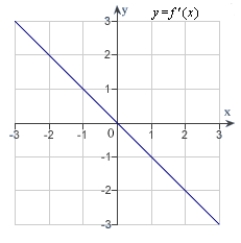
B)The derivative of f does not exist.
C)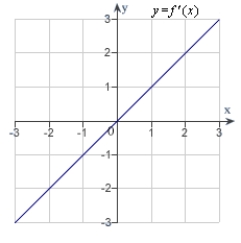
D)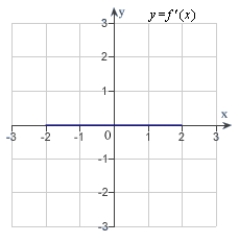
E)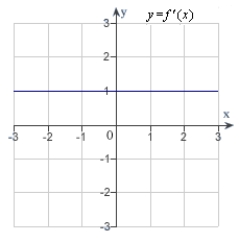

A)

B)The derivative of f does not exist.
C)

D)

E)


Unlock Deck
Unlock for access to all 107 flashcards in this deck.
Unlock Deck
k this deck
30
Find the open interval(s) on which  is increasing or decreasing.
is increasing or decreasing.
A)increasing on decreasing on
decreasing on 
B)increasing on decreasing on
decreasing on 
C)increasing on decreasing on
decreasing on 
D)increasing on decreasing on
decreasing on 
E)increasing on decreasing on
decreasing on 
 is increasing or decreasing.
is increasing or decreasing.A)increasing on
 decreasing on
decreasing on 
B)increasing on
 decreasing on
decreasing on 
C)increasing on
 decreasing on
decreasing on 
D)increasing on
 decreasing on
decreasing on 
E)increasing on
 decreasing on
decreasing on 

Unlock Deck
Unlock for access to all 107 flashcards in this deck.
Unlock Deck
k this deck
31
For the function  :(a) Find the critical numbers of f (if any);(b) Find the open intervals where the function is increasing or decreasing; and(c) Apply the First Derivative Test to identify all relative extrema.Use a graphing utility to confirm your results.
:(a) Find the critical numbers of f (if any);(b) Find the open intervals where the function is increasing or decreasing; and(c) Apply the First Derivative Test to identify all relative extrema.Use a graphing utility to confirm your results.
A)(a) (b) decreasing:
(b) decreasing:  ; increasing:
; increasing:  (c) relative min:
(c) relative min: 
B)(a) (b) increasing:
(b) increasing:  ; decreasing:
; decreasing:  (c) relative max:
(c) relative max: 
C)(a) (b) decreasing:
(b) decreasing:  ; increasing:
; increasing:  (c) relative min:
(c) relative min:  ; relative max:
; relative max: 
D)(a) (b) decreasing:
(b) decreasing:  ; increasing:
; increasing:  (c) relative min:
(c) relative min: 
E)(a) (b) increasing:
(b) increasing:  ; decreasing:
; decreasing:  (c) relative max:
(c) relative max: 
 :(a) Find the critical numbers of f (if any);(b) Find the open intervals where the function is increasing or decreasing; and(c) Apply the First Derivative Test to identify all relative extrema.Use a graphing utility to confirm your results.
:(a) Find the critical numbers of f (if any);(b) Find the open intervals where the function is increasing or decreasing; and(c) Apply the First Derivative Test to identify all relative extrema.Use a graphing utility to confirm your results.A)(a)
 (b) decreasing:
(b) decreasing:  ; increasing:
; increasing:  (c) relative min:
(c) relative min: 
B)(a)
 (b) increasing:
(b) increasing:  ; decreasing:
; decreasing:  (c) relative max:
(c) relative max: 
C)(a)
 (b) decreasing:
(b) decreasing:  ; increasing:
; increasing:  (c) relative min:
(c) relative min:  ; relative max:
; relative max: 
D)(a)
 (b) decreasing:
(b) decreasing:  ; increasing:
; increasing:  (c) relative min:
(c) relative min: 
E)(a)
 (b) increasing:
(b) increasing:  ; decreasing:
; decreasing:  (c) relative max:
(c) relative max: 

Unlock Deck
Unlock for access to all 107 flashcards in this deck.
Unlock Deck
k this deck
32
Determine whether the Mean Value Theorem can be applied to the function ![<strong>Determine whether the Mean Value Theorem can be applied to the function on the closed interval [0,14]. If the Mean Value Theorem can be applied, find all numbers c in the open interval (0,14) such that .</strong> A)MVT applies; 3.5 B)MVT applies; C)MVT applies; 7 D)MVT applies; E)MVT does not apply](https://d2lvgg3v3hfg70.cloudfront.net/TBX8702/11ec1854_fdab_b1ba_acfc_85cf9fbe66a0_TBX8702_11.jpg) on the closed interval [0,14]. If the Mean Value Theorem can be applied, find all numbers c in the open interval (0,14) such that
on the closed interval [0,14]. If the Mean Value Theorem can be applied, find all numbers c in the open interval (0,14) such that ![<strong>Determine whether the Mean Value Theorem can be applied to the function on the closed interval [0,14]. If the Mean Value Theorem can be applied, find all numbers c in the open interval (0,14) such that .</strong> A)MVT applies; 3.5 B)MVT applies; C)MVT applies; 7 D)MVT applies; E)MVT does not apply](https://d2lvgg3v3hfg70.cloudfront.net/TBX8702/11ec1854_fdab_b1bb_acfc_c3d4778a5896_TBX8702_11.jpg) .
.
A)MVT applies; 3.5
B)MVT applies;![<strong>Determine whether the Mean Value Theorem can be applied to the function on the closed interval [0,14]. If the Mean Value Theorem can be applied, find all numbers c in the open interval (0,14) such that .</strong> A)MVT applies; 3.5 B)MVT applies; C)MVT applies; 7 D)MVT applies; E)MVT does not apply](https://d2lvgg3v3hfg70.cloudfront.net/TBX8702/11ec1854_fdab_b1bc_acfc_6bcd7e7c9e9e_TBX8702_11.jpg)
C)MVT applies; 7
D)MVT applies;![<strong>Determine whether the Mean Value Theorem can be applied to the function on the closed interval [0,14]. If the Mean Value Theorem can be applied, find all numbers c in the open interval (0,14) such that .</strong> A)MVT applies; 3.5 B)MVT applies; C)MVT applies; 7 D)MVT applies; E)MVT does not apply](https://d2lvgg3v3hfg70.cloudfront.net/TBX8702/11ec1854_fdab_b1bd_acfc_23f270bea10a_TBX8702_11.jpg)
E)MVT does not apply
![<strong>Determine whether the Mean Value Theorem can be applied to the function on the closed interval [0,14]. If the Mean Value Theorem can be applied, find all numbers c in the open interval (0,14) such that .</strong> A)MVT applies; 3.5 B)MVT applies; C)MVT applies; 7 D)MVT applies; E)MVT does not apply](https://d2lvgg3v3hfg70.cloudfront.net/TBX8702/11ec1854_fdab_b1ba_acfc_85cf9fbe66a0_TBX8702_11.jpg) on the closed interval [0,14]. If the Mean Value Theorem can be applied, find all numbers c in the open interval (0,14) such that
on the closed interval [0,14]. If the Mean Value Theorem can be applied, find all numbers c in the open interval (0,14) such that ![<strong>Determine whether the Mean Value Theorem can be applied to the function on the closed interval [0,14]. If the Mean Value Theorem can be applied, find all numbers c in the open interval (0,14) such that .</strong> A)MVT applies; 3.5 B)MVT applies; C)MVT applies; 7 D)MVT applies; E)MVT does not apply](https://d2lvgg3v3hfg70.cloudfront.net/TBX8702/11ec1854_fdab_b1bb_acfc_c3d4778a5896_TBX8702_11.jpg) .
.A)MVT applies; 3.5
B)MVT applies;
![<strong>Determine whether the Mean Value Theorem can be applied to the function on the closed interval [0,14]. If the Mean Value Theorem can be applied, find all numbers c in the open interval (0,14) such that .</strong> A)MVT applies; 3.5 B)MVT applies; C)MVT applies; 7 D)MVT applies; E)MVT does not apply](https://d2lvgg3v3hfg70.cloudfront.net/TBX8702/11ec1854_fdab_b1bc_acfc_6bcd7e7c9e9e_TBX8702_11.jpg)
C)MVT applies; 7
D)MVT applies;
![<strong>Determine whether the Mean Value Theorem can be applied to the function on the closed interval [0,14]. If the Mean Value Theorem can be applied, find all numbers c in the open interval (0,14) such that .</strong> A)MVT applies; 3.5 B)MVT applies; C)MVT applies; 7 D)MVT applies; E)MVT does not apply](https://d2lvgg3v3hfg70.cloudfront.net/TBX8702/11ec1854_fdab_b1bd_acfc_23f270bea10a_TBX8702_11.jpg)
E)MVT does not apply

Unlock Deck
Unlock for access to all 107 flashcards in this deck.
Unlock Deck
k this deck
33
For the function  : (a) Find the critical numbers of f (if any);
: (a) Find the critical numbers of f (if any);
(b) Find the open intervals where the function is increasing or decreasing; and
(c) Apply the First Derivative Test to identify all relative extrema.
Then use a graphing utility to confirm your results.
A)(a) x = 0 , 4 (b) increasing: ; decreasing:
; decreasing:  (c) relative max:
(c) relative max:  ; relative min:
; relative min: 
B)(a) x = 0 , 4 (b) decreasing: ; increasing:
; increasing:  (c) relative min:
(c) relative min:  ; relative max:
; relative max: 
C)(a) x = 0 , 1 (b) increasing: ; decreasing:
; decreasing:  (c) relative max:
(c) relative max:  ; relative min:
; relative min: 
D)(a) x = 0 , 1 (b) decreasing: ; increasing:
; increasing:  (c) relative min:
(c) relative min:  ; relative max:
; relative max: 
E)(a) x = 0 , 1 (b) increasing: ; decreasing:
; decreasing:  (c) relative max:
(c) relative max:  ; no relative min.
; no relative min.
 : (a) Find the critical numbers of f (if any);
: (a) Find the critical numbers of f (if any);(b) Find the open intervals where the function is increasing or decreasing; and
(c) Apply the First Derivative Test to identify all relative extrema.
Then use a graphing utility to confirm your results.
A)(a) x = 0 , 4 (b) increasing:
 ; decreasing:
; decreasing:  (c) relative max:
(c) relative max:  ; relative min:
; relative min: 
B)(a) x = 0 , 4 (b) decreasing:
 ; increasing:
; increasing:  (c) relative min:
(c) relative min:  ; relative max:
; relative max: 
C)(a) x = 0 , 1 (b) increasing:
 ; decreasing:
; decreasing:  (c) relative max:
(c) relative max:  ; relative min:
; relative min: 
D)(a) x = 0 , 1 (b) decreasing:
 ; increasing:
; increasing:  (c) relative min:
(c) relative min:  ; relative max:
; relative max: 
E)(a) x = 0 , 1 (b) increasing:
 ; decreasing:
; decreasing:  (c) relative max:
(c) relative max:  ; no relative min.
; no relative min.
Unlock Deck
Unlock for access to all 107 flashcards in this deck.
Unlock Deck
k this deck
34
The graph of f is shown in the figure. Sketch a graph of the derivative of f. 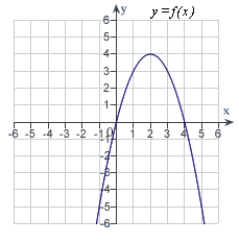
A)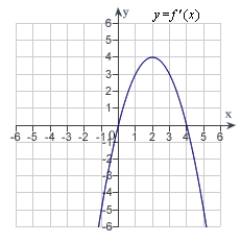
B)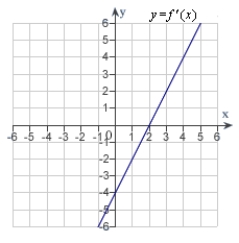
C)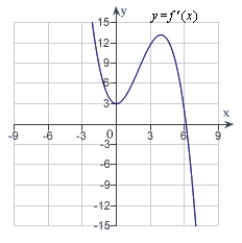
D)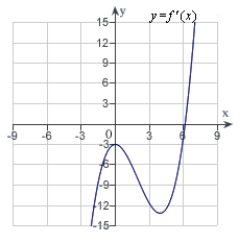
E)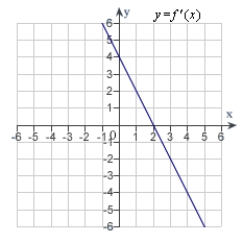

A)

B)

C)

D)

E)


Unlock Deck
Unlock for access to all 107 flashcards in this deck.
Unlock Deck
k this deck
35
Find the relative extremum of  by applying the First Derivative Test.
by applying the First Derivative Test.
A)relative maximum:
B)relative minimum:
C)relative maximum:
D)relative minimum:
E)relative minimum:
 by applying the First Derivative Test.
by applying the First Derivative Test.A)relative maximum:

B)relative minimum:

C)relative maximum:

D)relative minimum:

E)relative minimum:


Unlock Deck
Unlock for access to all 107 flashcards in this deck.
Unlock Deck
k this deck
36
The graph of f is shown in the figure. Sketch a graph of the derivative of f. 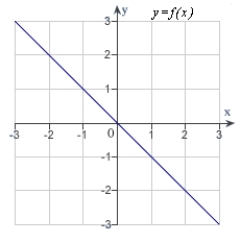
A)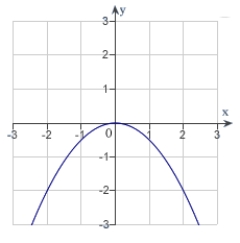
B)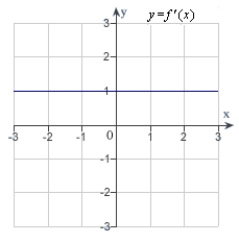
C)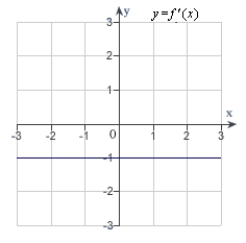
D)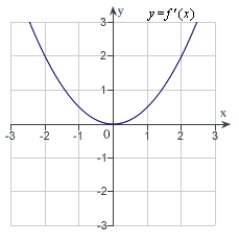
E)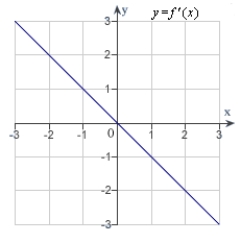

A)

B)

C)

D)

E)


Unlock Deck
Unlock for access to all 107 flashcards in this deck.
Unlock Deck
k this deck
37
Determine whether the Mean Value Theorem can be applied to the function ![<strong>Determine whether the Mean Value Theorem can be applied to the function on the closed interval [5,15]. If the Mean Value Theorem can be applied, find all numbers c in the open interval (5,15) such that .</strong> A)MVT applies; c = 9 B)MVT applies; c = 11 C)MVT applies; c = 10 D)MVT applies; c = 12 E)MVT applies; c = 8](https://d2lvgg3v3hfg70.cloudfront.net/TBX8702/11ec1854_fdab_8aa8_acfc_bd78593a34e8_TBX8702_11.jpg) on the closed interval [5,15]. If the Mean Value Theorem can be applied, find all numbers c in the open interval (5,15) such that
on the closed interval [5,15]. If the Mean Value Theorem can be applied, find all numbers c in the open interval (5,15) such that ![<strong>Determine whether the Mean Value Theorem can be applied to the function on the closed interval [5,15]. If the Mean Value Theorem can be applied, find all numbers c in the open interval (5,15) such that .</strong> A)MVT applies; c = 9 B)MVT applies; c = 11 C)MVT applies; c = 10 D)MVT applies; c = 12 E)MVT applies; c = 8](https://d2lvgg3v3hfg70.cloudfront.net/TBX8702/11ec1854_fdab_8aa9_acfc_97e42e734ad2_TBX8702_11.jpg) .
.
A)MVT applies; c = 9
B)MVT applies; c = 11
C)MVT applies; c = 10
D)MVT applies; c = 12
E)MVT applies; c = 8
![<strong>Determine whether the Mean Value Theorem can be applied to the function on the closed interval [5,15]. If the Mean Value Theorem can be applied, find all numbers c in the open interval (5,15) such that .</strong> A)MVT applies; c = 9 B)MVT applies; c = 11 C)MVT applies; c = 10 D)MVT applies; c = 12 E)MVT applies; c = 8](https://d2lvgg3v3hfg70.cloudfront.net/TBX8702/11ec1854_fdab_8aa8_acfc_bd78593a34e8_TBX8702_11.jpg) on the closed interval [5,15]. If the Mean Value Theorem can be applied, find all numbers c in the open interval (5,15) such that
on the closed interval [5,15]. If the Mean Value Theorem can be applied, find all numbers c in the open interval (5,15) such that ![<strong>Determine whether the Mean Value Theorem can be applied to the function on the closed interval [5,15]. If the Mean Value Theorem can be applied, find all numbers c in the open interval (5,15) such that .</strong> A)MVT applies; c = 9 B)MVT applies; c = 11 C)MVT applies; c = 10 D)MVT applies; c = 12 E)MVT applies; c = 8](https://d2lvgg3v3hfg70.cloudfront.net/TBX8702/11ec1854_fdab_8aa9_acfc_97e42e734ad2_TBX8702_11.jpg) .
.A)MVT applies; c = 9
B)MVT applies; c = 11
C)MVT applies; c = 10
D)MVT applies; c = 12
E)MVT applies; c = 8

Unlock Deck
Unlock for access to all 107 flashcards in this deck.
Unlock Deck
k this deck
38
Identify the open intervals where the function  is increasing or decreasing.
is increasing or decreasing.
A)decreasing: ; increasing:
; increasing: 
B)increasing: ; decreasing:
; decreasing: 
C)increasing on
D)decreasing on
E)decreasing on ; increasing on
; increasing on 
 is increasing or decreasing.
is increasing or decreasing.A)decreasing:
 ; increasing:
; increasing: 
B)increasing:
 ; decreasing:
; decreasing: 
C)increasing on

D)decreasing on

E)decreasing on
 ; increasing on
; increasing on 

Unlock Deck
Unlock for access to all 107 flashcards in this deck.
Unlock Deck
k this deck
39
Use the graph of the function  given below to estimate the open intervals on which the function is increasing or decreasing.
given below to estimate the open intervals on which the function is increasing or decreasing. 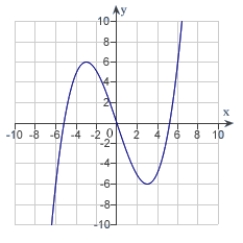
A)increasing on ; decreasing on
; decreasing on 
B)increasing on ; decreasing on
; decreasing on 
C)increasing on ; decreasing on
; decreasing on 
D)increasing on ; decreasing on
; decreasing on 
E)increasing on ; decreasing on
; decreasing on 
 given below to estimate the open intervals on which the function is increasing or decreasing.
given below to estimate the open intervals on which the function is increasing or decreasing. 
A)increasing on
 ; decreasing on
; decreasing on 
B)increasing on
 ; decreasing on
; decreasing on 
C)increasing on
 ; decreasing on
; decreasing on 
D)increasing on
 ; decreasing on
; decreasing on 
E)increasing on
 ; decreasing on
; decreasing on 

Unlock Deck
Unlock for access to all 107 flashcards in this deck.
Unlock Deck
k this deck
40
The height of an object t seconds after it is dropped from a height of 250 meters is  Find the average velocity of the object during the first 10 seconds.
Find the average velocity of the object during the first 10 seconds.
A)-100.0 m/sec
B)-5.1 m/sec
C)100.0 m/sec
D)49.0 m/sec
E)-49.0 m/sec
 Find the average velocity of the object during the first 10 seconds.
Find the average velocity of the object during the first 10 seconds.A)-100.0 m/sec
B)-5.1 m/sec
C)100.0 m/sec
D)49.0 m/sec
E)-49.0 m/sec

Unlock Deck
Unlock for access to all 107 flashcards in this deck.
Unlock Deck
k this deck
41
Match the function  with one of the following graphs.
with one of the following graphs.
A)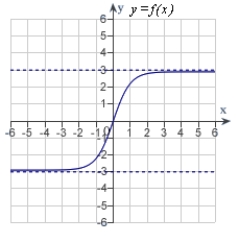
B)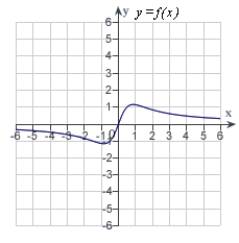
C)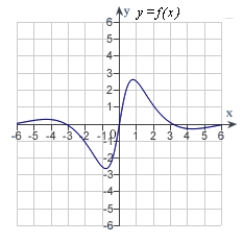
D)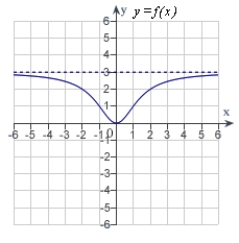
E)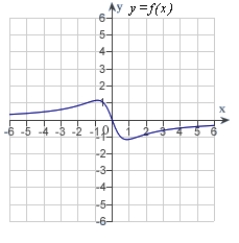
 with one of the following graphs.
with one of the following graphs.A)

B)

C)

D)

E)


Unlock Deck
Unlock for access to all 107 flashcards in this deck.
Unlock Deck
k this deck
42
Suppose the deflection D of a beam of length L is  where x is the distance from one end of the beam. Find the value of x that yields the maximum deflection .
where x is the distance from one end of the beam. Find the value of x that yields the maximum deflection .
A)
B)
C)
D)
E)
 where x is the distance from one end of the beam. Find the value of x that yields the maximum deflection .
where x is the distance from one end of the beam. Find the value of x that yields the maximum deflection .A)

B)

C)

D)

E)


Unlock Deck
Unlock for access to all 107 flashcards in this deck.
Unlock Deck
k this deck
43
The resistance R of a certain type of resistor is  where R is measured in ohms and the temperature T is measured in degrees Celsius. Use a computer algebra system to determine the minimum resistance for this type of resistor. Round your answer to two decimal places.
where R is measured in ohms and the temperature T is measured in degrees Celsius. Use a computer algebra system to determine the minimum resistance for this type of resistor. Round your answer to two decimal places.
A)
B)
C)
D)
E)
 where R is measured in ohms and the temperature T is measured in degrees Celsius. Use a computer algebra system to determine the minimum resistance for this type of resistor. Round your answer to two decimal places.
where R is measured in ohms and the temperature T is measured in degrees Celsius. Use a computer algebra system to determine the minimum resistance for this type of resistor. Round your answer to two decimal places.A)

B)

C)

D)

E)


Unlock Deck
Unlock for access to all 107 flashcards in this deck.
Unlock Deck
k this deck
44
The graph of f is shown. Graph f, f' and f'' on the same set of coordinate axes. 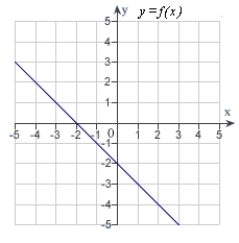
A)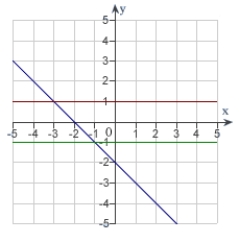
B)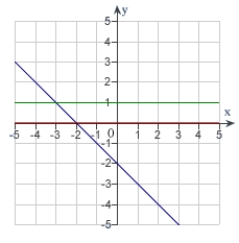
C)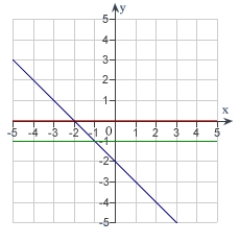
D)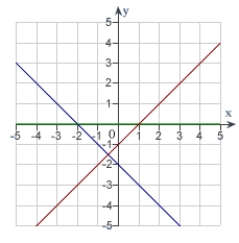
E)none of the above

A)

B)

C)

D)

E)none of the above

Unlock Deck
Unlock for access to all 107 flashcards in this deck.
Unlock Deck
k this deck
45
Find all relative extrema of the function  . Use the Second Derivative Test where applicable.
. Use the Second Derivative Test where applicable.
A)
B)
C)
D)
E)
 . Use the Second Derivative Test where applicable.
. Use the Second Derivative Test where applicable.A)

B)

C)

D)

E)


Unlock Deck
Unlock for access to all 107 flashcards in this deck.
Unlock Deck
k this deck
46
Find the cubic function of the form  are real numbers, which satisfies the conditions given below.
are real numbers, which satisfies the conditions given below. 
A)
B)
C)
D)
E)
 are real numbers, which satisfies the conditions given below.
are real numbers, which satisfies the conditions given below. 
A)

B)

C)

D)

E)


Unlock Deck
Unlock for access to all 107 flashcards in this deck.
Unlock Deck
k this deck
47
Find the limit. 
A)-3
B)
C)
D)7
E)3

A)-3
B)

C)

D)7
E)3

Unlock Deck
Unlock for access to all 107 flashcards in this deck.
Unlock Deck
k this deck
48
The graph of f is shown. Graph f, f' and f'' on the same set of coordinate axes. 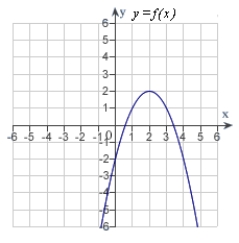
A)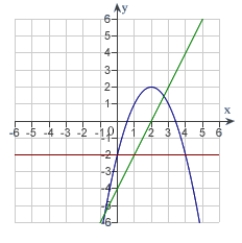
B)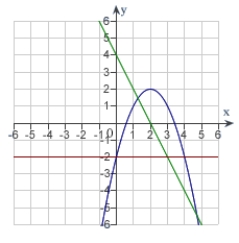
C)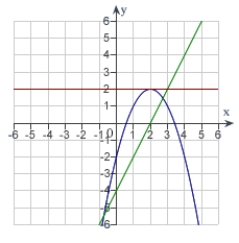
D)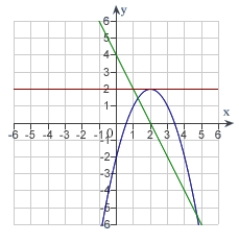
E)none of the above

A)

B)

C)

D)

E)none of the above

Unlock Deck
Unlock for access to all 107 flashcards in this deck.
Unlock Deck
k this deck
49
Suppose the annual sales S of a new product is given by  where t is time in years. Find the exact time when the annual sales are increasing at the greatest rate. Round your answer to three decimal places.
where t is time in years. Find the exact time when the annual sales are increasing at the greatest rate. Round your answer to three decimal places.
A)
B)
C)
D)
E)
 where t is time in years. Find the exact time when the annual sales are increasing at the greatest rate. Round your answer to three decimal places.
where t is time in years. Find the exact time when the annual sales are increasing at the greatest rate. Round your answer to three decimal places.A)

B)

C)

D)

E)


Unlock Deck
Unlock for access to all 107 flashcards in this deck.
Unlock Deck
k this deck
50
Determine the open intervals on which the graph of  is concave downward or concave upward.
is concave downward or concave upward.
A)concave downward on ; concave upward on
; concave upward on 
B)concave upward on
C)concave downward on
D)concave upward on ; concave downward on
; concave downward on 
E)concave downward on ; concave upward on
; concave upward on 
 is concave downward or concave upward.
is concave downward or concave upward.A)concave downward on
 ; concave upward on
; concave upward on 
B)concave upward on

C)concave downward on

D)concave upward on
 ; concave downward on
; concave downward on 
E)concave downward on
 ; concave upward on
; concave upward on 

Unlock Deck
Unlock for access to all 107 flashcards in this deck.
Unlock Deck
k this deck
51
Match the function  with one of the following graphs.
with one of the following graphs.
A)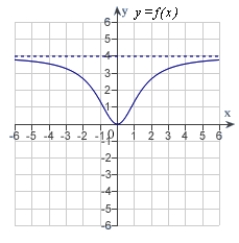
B)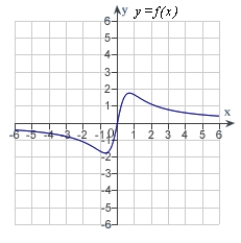
C)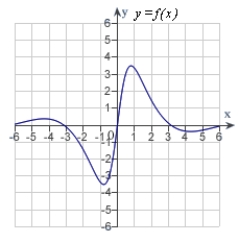
D)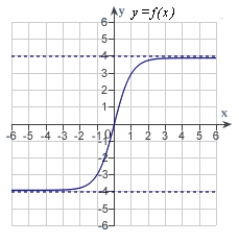
E)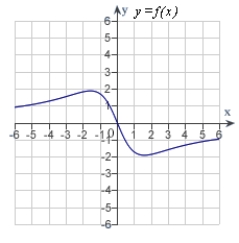
 with one of the following graphs.
with one of the following graphs.A)

B)

C)

D)

E)


Unlock Deck
Unlock for access to all 107 flashcards in this deck.
Unlock Deck
k this deck
52
Find all relative extrema of the function  . Use the Second Derivative Test where applicable.
. Use the Second Derivative Test where applicable.
A)relative max: ; no relative min
; no relative min
B)relative min: ; no relative max
; no relative max
C)no relative min; no relative max
D)relative max: ; relative min:
; relative min: 
E)relative min: ; relative max:
; relative max: 
 . Use the Second Derivative Test where applicable.
. Use the Second Derivative Test where applicable.A)relative max:
 ; no relative min
; no relative minB)relative min:
 ; no relative max
; no relative maxC)no relative min; no relative max
D)relative max:
 ; relative min:
; relative min: 
E)relative min:
 ; relative max:
; relative max: 

Unlock Deck
Unlock for access to all 107 flashcards in this deck.
Unlock Deck
k this deck
53
Find the points of inflection and discuss the concavity of the function. 
A)inflection point at ; concave downward on
; concave downward on  ; concave upward on
; concave upward on 
B)inflection point at ; concave upward on
; concave upward on  ; concave downward on
; concave downward on 
C)inflection point at ; concave downward on
; concave downward on  ; concave upward on
; concave upward on 
D)inflection point at ; concave upward on
; concave upward on  ; concave downward on
; concave downward on 
E)inflection point at ; concare downward on
; concare downward on  ; concave upward on
; concave upward on 

A)inflection point at
 ; concave downward on
; concave downward on  ; concave upward on
; concave upward on 
B)inflection point at
 ; concave upward on
; concave upward on  ; concave downward on
; concave downward on 
C)inflection point at
 ; concave downward on
; concave downward on  ; concave upward on
; concave upward on 
D)inflection point at
 ; concave upward on
; concave upward on  ; concave downward on
; concave downward on 
E)inflection point at
 ; concare downward on
; concare downward on  ; concave upward on
; concave upward on 

Unlock Deck
Unlock for access to all 107 flashcards in this deck.
Unlock Deck
k this deck
54
Determine the open intervals on which the graph of the function  is concave upward or concave downward.
is concave upward or concave downward.
A)
B)
C)
D)
E)
 is concave upward or concave downward.
is concave upward or concave downward.A)

B)

C)

D)

E)


Unlock Deck
Unlock for access to all 107 flashcards in this deck.
Unlock Deck
k this deck
55
Suppose the total cost C for ordering and storing x units is  What order size will produce a minimum cost? Round your answer to the nearest unit produced.
What order size will produce a minimum cost? Round your answer to the nearest unit produced.
A)
B)
C)
D)
E)
 What order size will produce a minimum cost? Round your answer to the nearest unit produced.
What order size will produce a minimum cost? Round your answer to the nearest unit produced.A)

B)

C)

D)

E)


Unlock Deck
Unlock for access to all 107 flashcards in this deck.
Unlock Deck
k this deck
56
The resistance R of a certain type of resistor is  where R is measured in ohms and the temperature T is measured in degrees Celsius. Use a computer algebra system to find
where R is measured in ohms and the temperature T is measured in degrees Celsius. Use a computer algebra system to find 
A)
B)
C)
D)
E)
 where R is measured in ohms and the temperature T is measured in degrees Celsius. Use a computer algebra system to find
where R is measured in ohms and the temperature T is measured in degrees Celsius. Use a computer algebra system to find 
A)

B)

C)

D)

E)


Unlock Deck
Unlock for access to all 107 flashcards in this deck.
Unlock Deck
k this deck
57
Suppose a manufacturer has determined that the total cost C of operating a factory is  where x is the number of units produced. At what level of production will the average cost per unit be minimized? (The average cost per unit is C/x.)
where x is the number of units produced. At what level of production will the average cost per unit be minimized? (The average cost per unit is C/x.)
A)
B)
C)
D)
E)
 where x is the number of units produced. At what level of production will the average cost per unit be minimized? (The average cost per unit is C/x.)
where x is the number of units produced. At what level of production will the average cost per unit be minimized? (The average cost per unit is C/x.)A)

B)

C)

D)

E)


Unlock Deck
Unlock for access to all 107 flashcards in this deck.
Unlock Deck
k this deck
58
Determine the open intervals on which the graph of  is concave downward or concave upward.
is concave downward or concave upward.
A)concave downward on
B)concave downward on ; concave upward on
; concave upward on 
C)concave upward on ; concave downward on
; concave downward on 
D)concave downward on ; concave upward on
; concave upward on 
E)concave upward on ; concave downward on
; concave downward on 
 is concave downward or concave upward.
is concave downward or concave upward.A)concave downward on

B)concave downward on
 ; concave upward on
; concave upward on 
C)concave upward on
 ; concave downward on
; concave downward on 
D)concave downward on
 ; concave upward on
; concave upward on 
E)concave upward on
 ; concave downward on
; concave downward on 

Unlock Deck
Unlock for access to all 107 flashcards in this deck.
Unlock Deck
k this deck
59
Find the points of inflection and discuss the concavity of the function  .
.
A)inflection point at x = 6; concave down on
B)no inflection points; concave down on
C)inflection point at x = 6; concave up on
D)no inflection points; concave up on
E)inflection point at x = 0; concave up on ; concave down on
; concave down on 
 .
.A)inflection point at x = 6; concave down on

B)no inflection points; concave down on

C)inflection point at x = 6; concave up on

D)no inflection points; concave up on

E)inflection point at x = 0; concave up on
 ; concave down on
; concave down on 

Unlock Deck
Unlock for access to all 107 flashcards in this deck.
Unlock Deck
k this deck
60
Find all relative extrema of the function  Use the Second Derivative Test where applicable.
Use the Second Derivative Test where applicable.
A)relative max: ; no relative min
; no relative min
B)relative max: ; no relative min
; no relative min
C)no relative max or min
D)relative min: ; no relative max
; no relative max
E)relative min: ; no relative max
; no relative max
 Use the Second Derivative Test where applicable.
Use the Second Derivative Test where applicable.A)relative max:
 ; no relative min
; no relative minB)relative max:
 ; no relative min
; no relative minC)no relative max or min
D)relative min:
 ; no relative max
; no relative maxE)relative min:
 ; no relative max
; no relative max
Unlock Deck
Unlock for access to all 107 flashcards in this deck.
Unlock Deck
k this deck
61
The graph of a function f is is shown below. Sketch the graph of the derivative  .
. 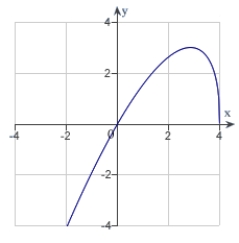
A)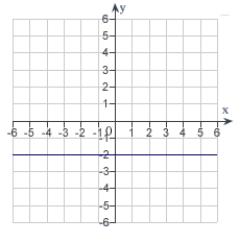
B)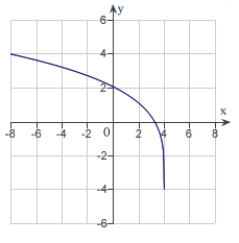
C)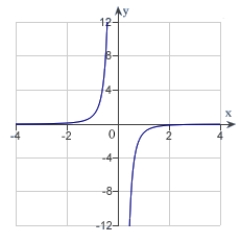
D)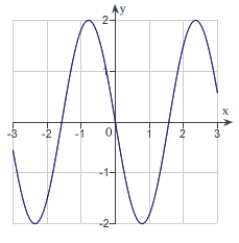
E)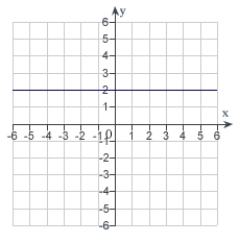
 .
. 
A)

B)

C)

D)

E)


Unlock Deck
Unlock for access to all 107 flashcards in this deck.
Unlock Deck
k this deck
62
Find the limit. 
A)
B)
C)0
D)
E)-4

A)

B)

C)0
D)

E)-4

Unlock Deck
Unlock for access to all 107 flashcards in this deck.
Unlock Deck
k this deck
63
Analyze and sketch a graph of the function  .
.
A)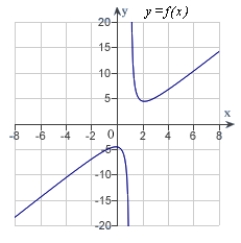
B)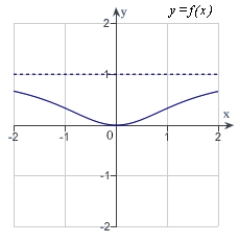
C)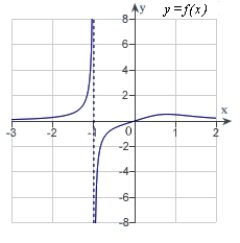
D)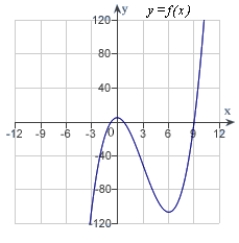
E)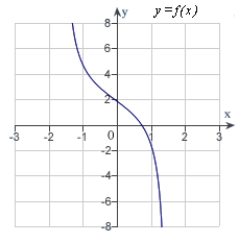
 .
.A)

B)

C)

D)

E)


Unlock Deck
Unlock for access to all 107 flashcards in this deck.
Unlock Deck
k this deck
64
A heat probe is attached to the heat exchanger of a heating system. The temperature T (in degrees Celsius) is recorded t seconds after the furnace is started. A model for the data recorded for the first two minutes is given by  Find
Find 
A)1501
B)82
C)1583
D)51
E)29
 Find
Find 
A)1501

B)82

C)1583

D)51

E)29


Unlock Deck
Unlock for access to all 107 flashcards in this deck.
Unlock Deck
k this deck
65
Analyze and sketch a graph of the function  .
.
A)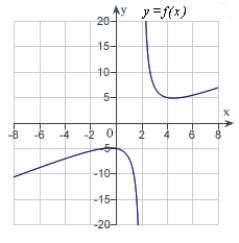
B)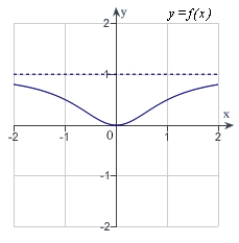
C)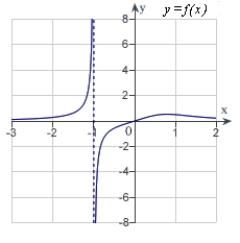
D)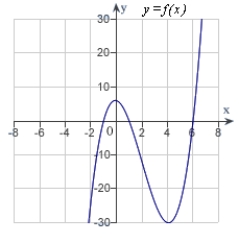
E)none of the above
 .
.A)

B)

C)

D)

E)none of the above

Unlock Deck
Unlock for access to all 107 flashcards in this deck.
Unlock Deck
k this deck
66
The graph shows the temperature T, in degrees Fahrenheit, of molten glass t seconds after it is removed from a kiln. 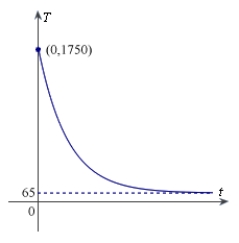 Find
Find 
A)
B)
C)
D)
E)
 Find
Find 
A)

B)

C)

D)

E)


Unlock Deck
Unlock for access to all 107 flashcards in this deck.
Unlock Deck
k this deck
67
Find the limit. 
A)
B)
C)1
D)0
E)does not exist

A)

B)

C)1
D)0
E)does not exist

Unlock Deck
Unlock for access to all 107 flashcards in this deck.
Unlock Deck
k this deck
68
A model for the average typing speeds S (words per minute) of a typing student after t weeks of lessons is given by  Find
Find 
A)96 words per minute
B)24 words per minute
C)52 words per minute
D)104 words per minute
E)16 words per minute
 Find
Find 
A)96 words per minute
B)24 words per minute
C)52 words per minute
D)104 words per minute
E)16 words per minute

Unlock Deck
Unlock for access to all 107 flashcards in this deck.
Unlock Deck
k this deck
69
A business has a cost of  for producing x units. The average cost per unit is
for producing x units. The average cost per unit is  Find the limit of
Find the limit of  as x approaches infinity.
as x approaches infinity.
A)250.0
B)300.0
C)0
D)1.0
E)1.2
 for producing x units. The average cost per unit is
for producing x units. The average cost per unit is  Find the limit of
Find the limit of  as x approaches infinity.
as x approaches infinity.A)250.0
B)300.0
C)0
D)1.0
E)1.2

Unlock Deck
Unlock for access to all 107 flashcards in this deck.
Unlock Deck
k this deck
70
The graph of a function f is is shown below. 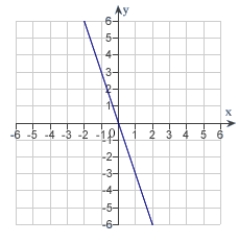 Sketch the graph of the derivative
Sketch the graph of the derivative  .
.
A)
B)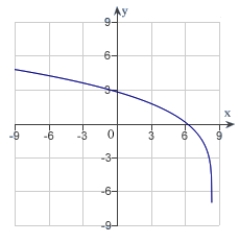
C)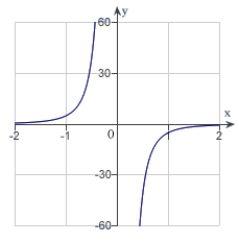
D)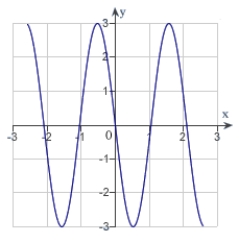
E)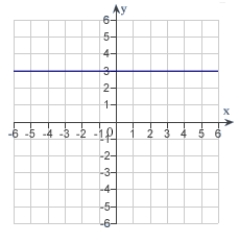
 Sketch the graph of the derivative
Sketch the graph of the derivative  .
.A)

B)

C)

D)

E)


Unlock Deck
Unlock for access to all 107 flashcards in this deck.
Unlock Deck
k this deck
71
The graph of a function f is is shown below. Sketch the graph of the derivative  .
. 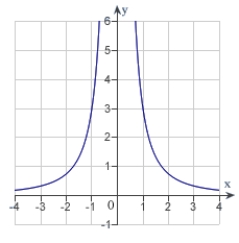
A)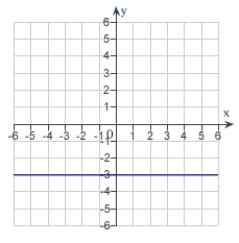
B)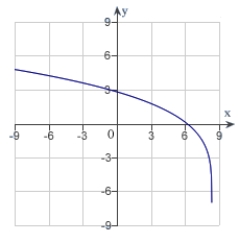
C)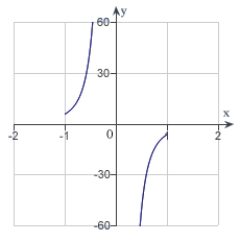
D)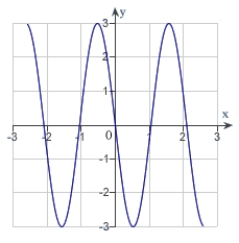
E)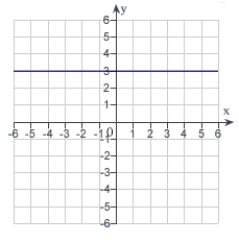
 .
. 
A)

B)

C)

D)

E)


Unlock Deck
Unlock for access to all 107 flashcards in this deck.
Unlock Deck
k this deck
72
Determine the slant asymptote of the graph of  .
.
A)
B)
C)
D)
E)no slant asymptote
 .
.A)

B)

C)

D)

E)no slant asymptote

Unlock Deck
Unlock for access to all 107 flashcards in this deck.
Unlock Deck
k this deck
73
Sketch the graph of the function  using any extrema, intercepts, symmetry, and asymptotes.
using any extrema, intercepts, symmetry, and asymptotes.
A)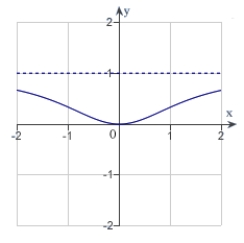
B)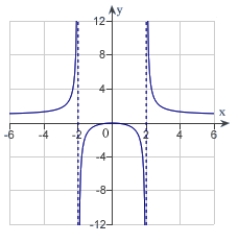
C)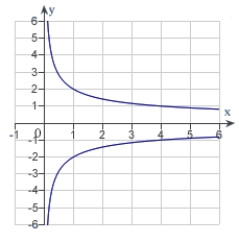
D)
E)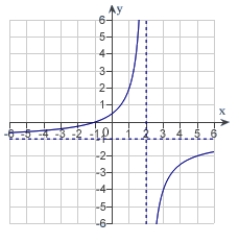
 using any extrema, intercepts, symmetry, and asymptotes.
using any extrema, intercepts, symmetry, and asymptotes.A)

B)

C)

D)

E)


Unlock Deck
Unlock for access to all 107 flashcards in this deck.
Unlock Deck
k this deck
74
Analyze and sketch a graph of the function  .
.
A)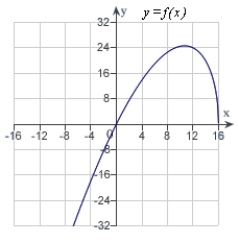
B)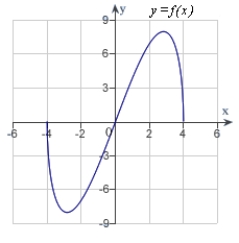
C)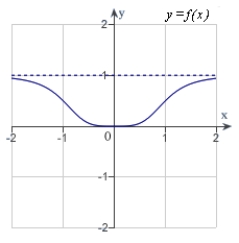
D)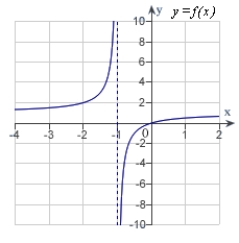
E)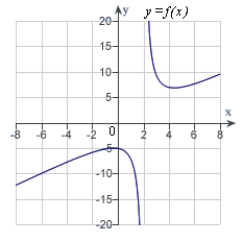
 .
.A)

B)

C)

D)

E)


Unlock Deck
Unlock for access to all 107 flashcards in this deck.
Unlock Deck
k this deck
75
Analyze and sketch a graph of the function  .
.
A)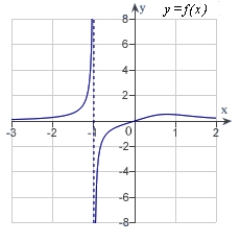
B)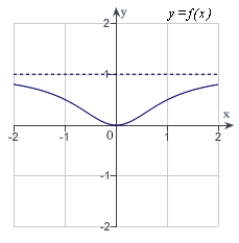
C)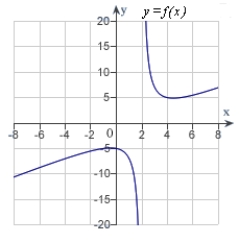
D)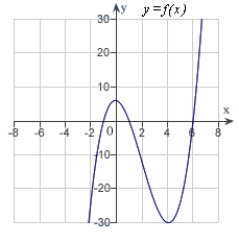
E)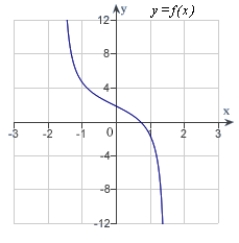
 .
.A)

B)

C)

D)

E)


Unlock Deck
Unlock for access to all 107 flashcards in this deck.
Unlock Deck
k this deck
76
Sketch the graph of the relation  using any extrema, intercepts, symmetry, and asymptotes.
using any extrema, intercepts, symmetry, and asymptotes.
A)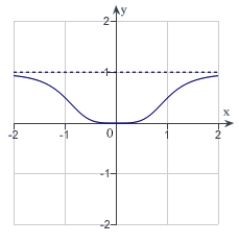
B)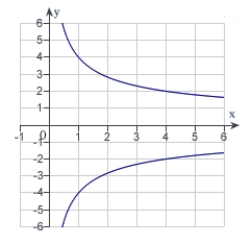
C)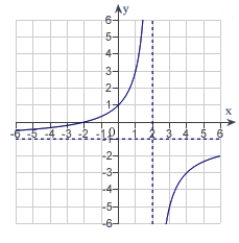
D)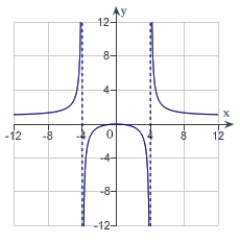
E)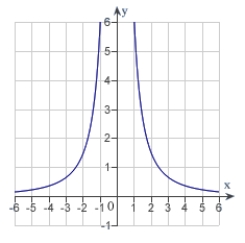
 using any extrema, intercepts, symmetry, and asymptotes.
using any extrema, intercepts, symmetry, and asymptotes.A)

B)

C)

D)

E)


Unlock Deck
Unlock for access to all 107 flashcards in this deck.
Unlock Deck
k this deck
77
Find the limit. 
A)
B)
C)7
D)1

A)

B)

C)7
D)1

Unlock Deck
Unlock for access to all 107 flashcards in this deck.
Unlock Deck
k this deck
78
Find the limit. 
A)8
B)
C)
D)1
E)

A)8
B)

C)

D)1
E)


Unlock Deck
Unlock for access to all 107 flashcards in this deck.
Unlock Deck
k this deck
79
Sketch the graph of the function  using any extrema, intercepts, symmetry, and asymptotes.
using any extrema, intercepts, symmetry, and asymptotes.
A)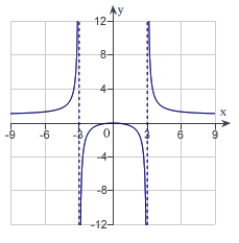
B)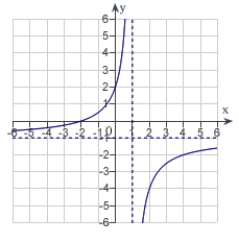
C)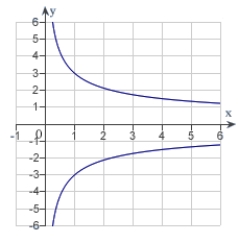
D)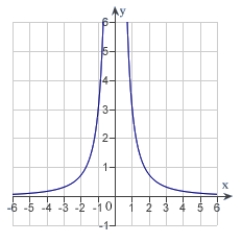
E)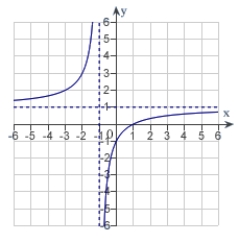
 using any extrema, intercepts, symmetry, and asymptotes.
using any extrema, intercepts, symmetry, and asymptotes.A)

B)

C)

D)

E)


Unlock Deck
Unlock for access to all 107 flashcards in this deck.
Unlock Deck
k this deck
80
Sketch the graph of the relation  using any extrema, intercepts, symmetry, and asymptotes.
using any extrema, intercepts, symmetry, and asymptotes.
A)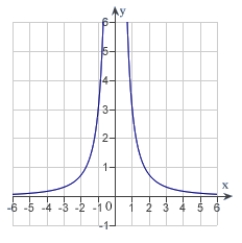
B)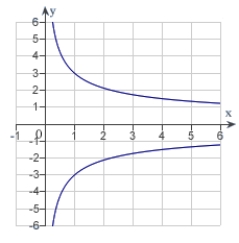
C)
D)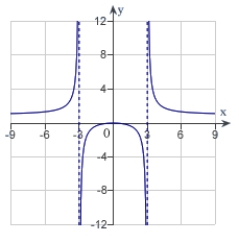
E)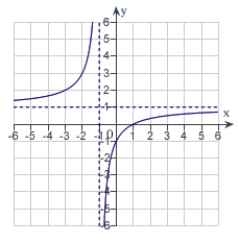
 using any extrema, intercepts, symmetry, and asymptotes.
using any extrema, intercepts, symmetry, and asymptotes.A)

B)

C)

D)

E)


Unlock Deck
Unlock for access to all 107 flashcards in this deck.
Unlock Deck
k this deck



